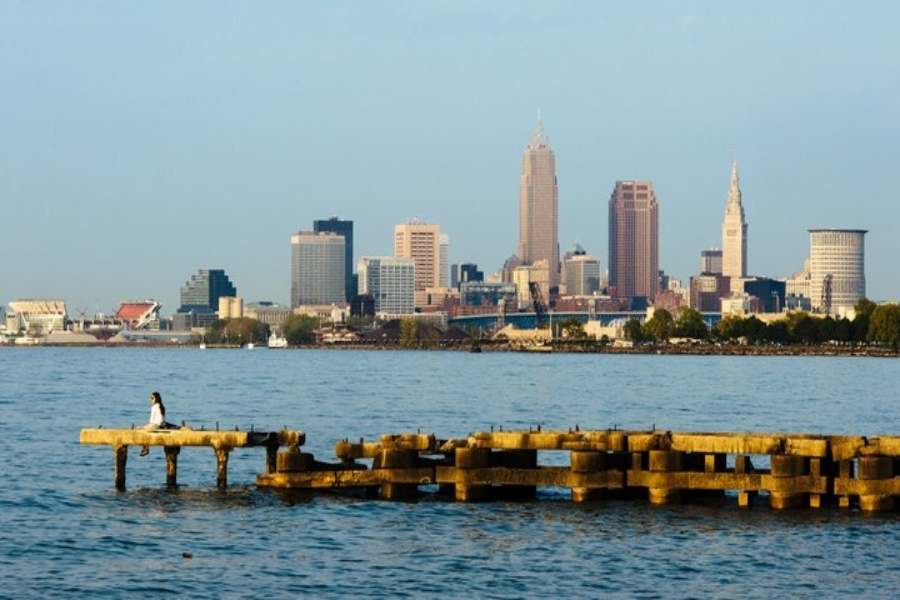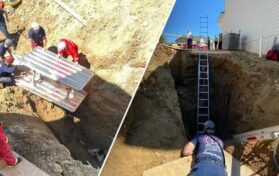
CLEVELAND, OH — The underwater exploration community suffered a profound loss this weekend as David Michael VanZandt, a prominent underwater explorer and advocate for maritime heritage, tragically lost his life during a diving expedition in Lake Erie. At 70 years old, VanZandt embarked on his first dive of the year, targeting a newly discovered shipwreck when the fatal accident occurred.
David Michael VanZandt, a resident of Lakewood, Ohio, was not just any diver. As the founder and director of Cleveland Underwater Explorers (CLUE), he dedicated much of his life to the exploration and documentation of submerged artifacts and shipwrecks within the Great Lakes. His work has been pivotal in bringing to light the submerged historical narratives of the lakes, enriching the historical knowledge and appreciation of this unique region.
The Search and Discovery
The U.S. Coast Guard reported VanZandt missing around 4 p.m. on Saturday following his failure to return from the dive. This initiated a swift and extensive search effort approximately six miles off the Cleveland shoreline. Despite the rapid and coordinated response, the operation concluded tragically. Divers from Lake County recovered his body near the East 9th Street Pier at 7:45 p.m., a discovery that was later confirmed by USCG Great Lakes through social media.
VanZandt had been diving from the R/V Sea Dragon, one of two CLUE-utilized research vessels. His commitment to exploring the Great Lakes was about discovering shipwrecks and preserving and sharing their stories with the world. The shipwreck he was exploring when he died had only recently been charted, highlighting the ongoing nature of his mission to uncover the mysteries lying beneath the lakes’ surfaces.
Since co-founding CLUE in 2001, VanZandt has transformed it into a critical institution for maritime research in the Great Lakes. Under his leadership, the organization conducted numerous expeditions that led to significant discoveries and generated crucial data about the region’s maritime history. Each of these projects, often undertaken in challenging conditions, contributed to a broader understanding of the Great Lakes’ historical and ecological significance.
VanZandt’s journey in underwater exploration began in 1995, marked by a passionate commitment to the field. When he co-founded CLUE, he was already an experienced diver and researcher. His approach combined rigorous scientific methodology with a deep respect for the artifacts and sites he explored. This dual focus ensured that the stories of the lakes’ shipwrecks did more than just fascinate; they educated and inspired.
The work of VanZandt and his team at CLUE has not only shed light on the past but has also served as a vital resource for safety in the present. Mapping and documenting shipwrecks have helped inform safer navigation routes for current maritime traffic, illustrating how history can serve contemporary needs.
Moreover, Van Zandt’s efforts extended beyond the technical aspects of underwater exploration. He was deeply involved in community outreach, educating the public about preserving maritime heritage and fostering an appreciation for the Great Lakes as a historical and natural resource.
Reflecting on the Risks
Underwater exploration offers invaluable insights into the hidden corners of our planet, but it is fraught with significant risks. The environments in which seasoned divers like David Michael VanZandt operate are often unpredictable and have myriad hazards. These professionals navigate through dark, cold waters with limited visibility, and the topography can be as unpredictable as the weather above the surface.
Key risks include sudden changes in weather, which can drastically affect water conditions, strong underwater currents that can sweep even the most experienced diver off course, and the ever-present danger of equipment failure. Technical issues, such as malfunctioning dive computers or failure of breathing apparatus, can have fatal consequences. Moreover, the physiological effects of deep-water pressure on the body, known as decompression sickness, or ‘the bends’, adds another layer of risk.
Each dive into such environments is a complex operation requiring meticulous planning and contingency strategies. Despite these preparations, the underwater world remains a formidable frontier, and divers like VanZandt constantly push the limits of human endurance and technology.
The diving community is aware of these perils and often uses each accident as a critical learning point to fortify safety protocols and enhance training programs. These improvements aim to safeguard divers’ lives and ensure that the pursuit of underwater exploration does not come at the cost of human life. The legacy of divers who have lost their lives is often a catalyst for advancing diving technology and operational procedures, ensuring that future generations of underwater explorers are better equipped to handle the challenges of the deep.
A Community Mourns
The loss of David Michael VanZandt is felt deeply across the community of underwater researchers, historians, and enthusiasts. CLUE’s statement expressed their condolences to his wife and family, and the broader community has echoed this sentiment. Tributes pouring in from around the world reflect the high regard in which he was held and the impact of his work.
The Cuyahoga County Medical Examiner’s Office has confirmed the deceased’s identity as VanZandt. As investigations continue into the exact circumstances of his tragic death, the legacy of his life’s work remains a testament to his profound dedication to uncovering and sharing the hidden histories of the Great Lakes.
David Michael VanZandt’s contributions to maritime archaeology and his efforts to safeguard the Great Lakes’ submerged heritage have left an indelible mark. His untimely death is a significant loss to the community but also a reminder of the passion and perseverance that characterize underwater exploration. As the community reflects on his achievements and mourns his loss, his legacy inspires future explorers and historians.





